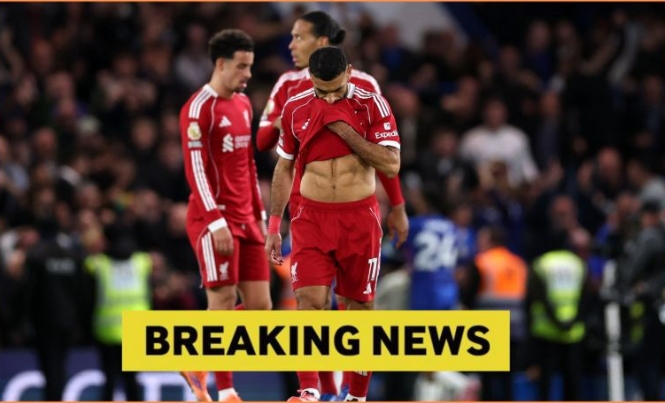Liverpool’s 3–2 defeat to Brentford has sent shockwaves through Anfield, but what truly grabbed headlines wasn’t just the loss—it was Virgil van Dijk’s fiery post-match outburst that laid bare the growing tension within the Liverpool camp. The captain, known for his composure and leadership, delivered a scathing critique that exposed his frustration with both the manager and the team’s tactical direction.
Moments after the final whistle, van Dijk didn’t hold back. “He’s clearly not ready,” the Dutchman told reporters. “He should not have been started in a crucial match like this. Well, I don’t blame him—I blame the coach who made this call, and now we are all paying for it.” The tone of his words said it all: patience had run out.
Liverpool had entered the game desperate for a strong performance after a string of uneven results. Instead, they collapsed against a Brentford side that played with hunger, aggression, and precision. Every defensive lapse was punished. The Reds looked disorganized, slow to react, and far from the resilient force fans are used to seeing. For a captain like van Dijk, it was a nightmare—and the post-match explosion was the breaking point.
Reports from inside the dressing room suggest van Dijk’s comments were aimed at one of Liverpool’s younger or newly signed players who was given a surprise start in a high-pressure fixture. That player reportedly struggled to adapt to the pace and intensity of the game, committing errors that led directly to Brentford’s goals. According to sources, van Dijk believes the youngster was “set up to fail” by being thrown into such a difficult situation before being fully ready.
Manager Arne Slot’s tactical approach has come under intense scrutiny since the defeat. His decision to rotate heavily and experiment with a less experienced lineup left fans bewildered even before kickoff. Critics argue that in a must-win Premier League game, Slot gambled—and lost. Liverpool were slow out of the blocks, conceding early to Dango Ouattara, before Kevin Schade doubled Brentford’s advantage. Though Milos Kerkez and Mohamed Salah managed to pull goals back, it wasn’t enough.
The defensive disarray was evident throughout. Communication broke down between the back line and midfield, and the leadership that once defined Liverpool’s identity appeared fractured. Van Dijk’s visible anger on the pitch—clapping his hands in frustration, shouting instructions that went ignored—mirrored the feelings of the crowd.
After the match, insiders claimed van Dijk confronted members of the coaching staff, questioning repeated tactical mistakes and poor decision-making. “We can’t keep making the same errors,” he reportedly said, pointing out that the team seems to lack cohesion and defensive discipline. His leadership style has always been direct, but this time, it felt like a public declaration of lost confidence.
The loss also marks a turning point in Arne Slot’s tenure. Having started his Liverpool project with promise, the cracks are now showing. Fans have begun questioning whether his rotations and tactical experiments are destabilizing the team. Social media reactions poured in almost immediately after van Dijk’s comments:
“Van Dijk is right—you can’t throw an unprepared player into a high-stakes game.”
“Slot is overthinking things. Liverpool needs stability, not experiments.”
“At least the captain said what everyone’s been thinking.”
Others, however, warned that public criticism could deepen divisions inside the dressing room if not addressed swiftly. “The captain shouldn’t go public like that,” wrote one fan. “If there’s frustration, it should stay behind closed doors. We can’t afford chaos right now.”
With difficult fixtures ahead—including matches against top-six rivals—Arne Slot faces the biggest test of his managerial career. He must rebuild trust, both within the locker room and among supporters, who are demanding clarity and consistency. For van Dijk, this outburst wasn’t just frustration—it was a plea for accountability and leadership from the top down.
Liverpool’s season now teeters on the edge. If the internal tension continues, the damage could go beyond one defeat. As one veteran Anfield supporter put it perfectly online: “When your captain starts questioning the coach, something deeper is wrong. This isn’t just about losing to Brentford—it’s about losing the identity that made Liverpool feared.”
For now, all eyes are on Slot’s response. Will he restore unity—or will this rift between captain and coach mark the beginning of a storm Liverpool cannot contain?


